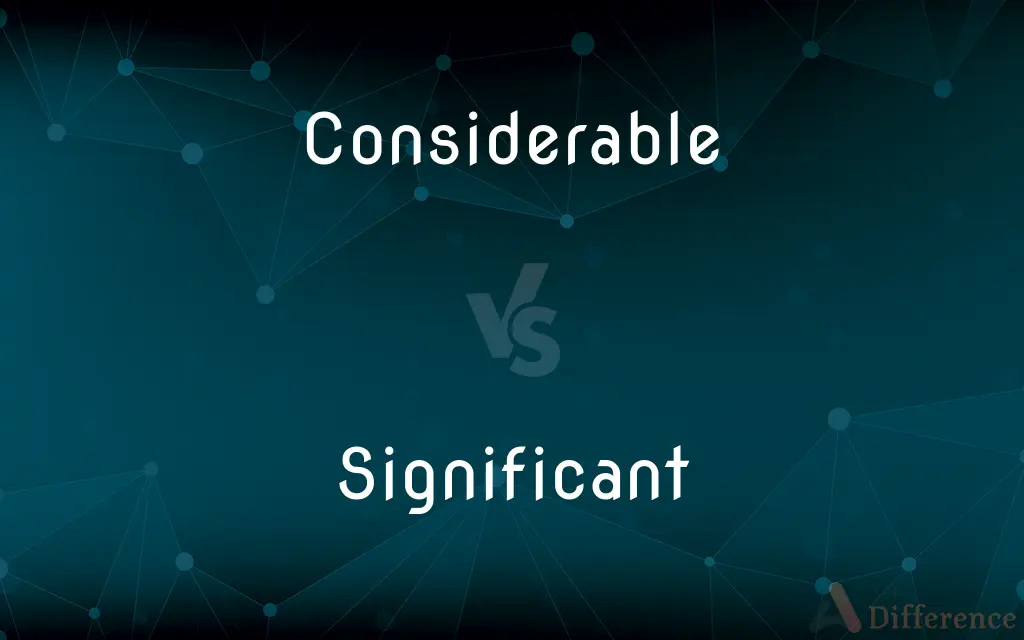Considerable vs. Significant — What's the Difference?
By Tayyaba Rehman & Maham Liaqat — Updated on April 8, 2024
"Considerable" emphasizes the size or extent of something, often implying it's large or of notable size, while "significant" focuses on the importance or influence of something, suggesting it has a meaningful impact.

Difference Between Considerable and Significant
Table of Contents
ADVERTISEMENT
Key Differences
Considerable is used to describe something that is notably large in size, amount, or degree. It conveys that the subject is worthy of attention due to its size or extent but doesn't necessarily imply importance or impact. For instance, a considerable amount of money means a large sum, regardless of its effect on the situation. On the other hand, significant denotes that something is important, noteworthy, or consequential. It suggests that the subject has a meaningful impact or holds importance in its context. A significant discovery, for example, is one that has a profound effect on the field it pertains to.
When discussing quantities, considerable often quantifies the physical size or number, suggesting something that cannot be ignored because of its volume. In contrast, significant might refer to quantities too, but with an emphasis on the effect or value of the quantity rather than its sheer size. For example, a significant number of responses could be fewer than a considerable number but might have a greater impact on the outcome of a study.
In literature or spoken language, the use of considerable can imply that the speaker wishes to draw attention to the size or scope of an item or situation without asserting its importance. Whereas, using significant not only highlights the importance of the subject but also suggests that it has or could have a substantial effect or meaning behind it.
The choice between considerable and significant can also affect the tone or focus of a discussion. Describing an amount as considerable might simply aim to impress or inform about size, while calling something significant could provoke further inquiry into its implications or importance.
In research and scientific writing, the distinction becomes more pronounced. A considerable variation in data points might merely indicate a wide range of responses, while a significant variation implies that the difference observed has important implications or is statistically meaningful.
ADVERTISEMENT
Comparison Chart
Definition
Large in size, amount, or degree
Important, having a noticeable impact or influence
Focus
Size or extent
Importance or impact
Context
Often used quantitatively
Used in qualitative and quantitative contexts
Implication
Noteworthy due to volume or scope
Noteworthy due to importance or effect
Usage in Sentences
Implies notable size without asserting importance
Suggests meaningful impact or value
Compare with Definitions
Considerable
Large or substantial in amount.
They donated a considerable sum to the charity.
Significant
Important or of consequence.
The scientist made a significant breakthrough in research.
Considerable
Worthy of attention due to size.
The project required a considerable amount of time.
Significant
Statistically meaningful.
The results showed a significant difference between the two groups.
Considerable
Notably large in degree or intensity.
There was considerable interest in the new policy.
Significant
Having a noticeable or marked effect.
There was a significant improvement in her health.
Considerable
Referring to a large extent or range.
The study covers a considerable range of topics.
Significant
Meaningfully large or worthy of attention.
A significant portion of the budget was allocated to healthcare.
Considerable
Significant in size, not necessarily in impact.
The book gained considerable popularity among readers.
Significant
Indicating a considerable degree of importance.
His contributions to the field were significant.
Considerable
Large in amount, extent, or degree
A writer of considerable influence.
Significant
Sufficiently great or important to be worthy of attention; noteworthy
A significant increase in sales
Considerable
Worthy of consideration; significant
The economy was a considerable issue in the campaign.
Significant
Having a particular meaning; indicative of something
In times of stress her dreams seemed to her especially significant
Considerable
A considerable amount, extent, or degree.
Significant
Relating to or having significance.
Considerable
Significant; worth considering.
I've spent a considerable amount of time on this.
Significant
Having or expressing a meaning
Are the markings on the stone significant?.
Considerable
Large in amount.
Significant
Having or expressing a covert or nonverbal meaning; suggestive
A significant glance.
Considerable
(obsolete) A thing to be considered, consideration.
Significant
Having or likely to have a major effect; important
A significant change in the tax laws.
Considerable
Worthy of consideration; requiring to be observed, borne in mind, or attended to.
It is considerable, that some urns have had inscriptions on them expressing that the lamps were burning.
Eternity is infinitely the most considerable duration.
Significant
Fairly large in amount or quantity
Significant casualties.
No significant opposition.
Considerable
Of some distinction; noteworthy; influential; respectable; - said of persons.
You are, indeed, a very considerable man.
Significant
(Statistics) Of or relating to observations or occurrences that are too closely correlated to be attributed to chance and therefore indicate a systematic relationship.
Considerable
Of importance or value.
In painting, not every action, nor every person, is considerable enough to enter into the cloth.
A considerable sum of money.
Significant
Signifying something; carrying meaning.
A significant word or sound
A significant look
Considerable
Large or relatively large in number or amount or extent or degree;
A considerable quantity
The economy was a considerable issue in the campaign
Went to considerable trouble for us
Spent a considerable amount of time on the problem
Significant
Having a covert or hidden meaning.
Significant
Having a noticeable or major effect.
That was a significant step in the right direction.
The First World War was a significant event.
Significant
Reasonably large in number or amount.
Significant
(statistics) Having a low probability of occurring by chance (for example, having high correlation and thus likely to be related).
Significant
That which has significance; a sign; a token; a symbol.
Significant
Fitted or designed to signify or make known somethingl having a meaning; standing as a sign or token; expressive or suggestive; as, a significant word or sound; a significant look.
It was well said of Plotinus, that the stars were significant, but not efficient.
Significant
Deserving to be considered; important; momentous; as, a significant event.
Significant
That which has significance; a sign; a token; a symbol.
In dumb significants proclaim your thoughts.
Significant
Important in effect or meaning;
A significant change in tax laws
A significant change in the Constitution
A significant contribution
Significant details
Statistically significant
Significant
Fairly large;
Won by a substantial margin
Significant
Too closely correlated to be attributed to chance and therefore indicating a systematic relation;
The interaction effect is significant at the .01 level
No significant difference was found
Significant
Rich in significance or implication;
A meaning look
Pregnant with meaning
Common Curiosities
What does considerable mean?
Considerable means notably large in size, amount, or degree, implying that something is large enough to merit attention.
Can a quantity be both considerable and significant?
Yes, a quantity can be both considerable (large in amount) and significant (important or impactful).
Is something considerable always significant?
Not necessarily; something considerable is large or extensive, but it may not always be important or impactful (significant).
Can the significance of something be quantified?
Yes, the significance of something can be quantified, especially in research or statistical analysis, where it refers to the meaningfulness of results.
How does the importance of something relate to being considerable or significant?
Importance is more directly related to something being significant, as it denotes impact or value, whereas considerable emphasizes size or extent.
Can an event be significant but not considerable?
Yes, an event can be significant (impactful or important) without being considerable (large in scale).
What does significant mean?
Significant means important, having a noticeable impact or influence, or being meaningfully large in context.
What makes a discovery significant?
A discovery is significant if it has a profound impact on its field, offers new insights, or leads to meaningful advancements.
How do you decide whether to use considerable or significant?
Choose "considerable" to emphasize size or amount and "significant" to highlight importance or impact.
What is an example of a considerable achievement?
A considerable achievement might refer to completing a large-scale project or winning numerous awards, emphasizing the scale of accomplishment.
What is an example of a significant achievement?
A significant achievement refers to an accomplishment with a profound impact, like a scientific breakthrough that changes a field of study.
How does context affect the use of considerable vs. significant?
The choice between the two depends on whether the emphasis is on the size or extent (considerable) or on the importance and impact (significant).
Does considerable or significant imply a positive outcome?
Neither term inherently implies a positive outcome; they can describe positive or negative contexts based on size or impact, respectively.
Can a change be both considerable and significant?
Yes, a change can be both considerable (large or notable in degree) and significant (having important implications or effects).
How do considerable and significant relate to statistical analysis?
In statistical analysis, considerable might refer to large data variations, while significant refers to results that have meaningful implications.
Share Your Discovery

Previous Comparison
Authorize vs. Approve
Next Comparison
Tenant vs. ResidentAuthor Spotlight
Written by
Tayyaba RehmanTayyaba Rehman is a distinguished writer, currently serving as a primary contributor to askdifference.com. As a researcher in semantics and etymology, Tayyaba's passion for the complexity of languages and their distinctions has found a perfect home on the platform. Tayyaba delves into the intricacies of language, distinguishing between commonly confused words and phrases, thereby providing clarity for readers worldwide.
Co-written by
Maham Liaqat















































